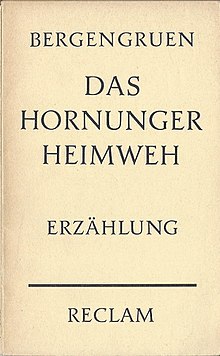The Hornunger homesickness
The Hornunger Heimweh is a short story by Werner Bergengruen that appeared in Leipzig in 1942.
Georg Friedrich Busch, who made his fortune in South America, is looking for the recipe against his homesickness for South Baden .
content
Before the World War, Georg grew up in Hornungen am See in the south Baden Principality of Thann-Ballenstein. The young person falls in love with Elisabeth Williger. After the first kiss, Alphons Kürtzell, who is three years his senior, gets in his way. The love triangle ends in quarrel and catastrophe. During an excursion, the rowing boat capsizes on the nightly journey home and Kürtzell has disappeared without a trace. Georg searches for Kürtzell unsuccessfully and flees to South America in panic fear of being sentenced to a court. Hornung revolutionaries had fled there in advance as early as 1849 . Georg has the luck of being able overseas. He becomes rich and becomes a landowner. An unreserved correspondence with Elisabeth, who is now in the northeast of the empire , begins. Georg learns that he is sentenced to life in prison. Georg makes an application to Elisabeth by letter. She wants to marry him, but dies on the crossing. Georg's homesickness begins. After extensive preparation, he found the remedy for his "illness". Georg discovers his “doppelganger” Josef Schachtner in South America, who travels with him to Europe for a fee and sits in the dock for Georg in Hornungen. Georg observes the criminal process from safe Basel . The wrong Georg gets life sentence and ends up in the state penitentiary Eckartsberg. Georg can't help it - he leaves the foreign observation post and - having become brave - travels to Hornungen. In the hotel, Georg meets Kürtzell, who was believed to be dead and who has also come from Switzerland. Kürtzell explains that he actually wanted to get Georg out of prison. The solution to the riddle: After the boat accident, Kürtzell fled from debt and from a girl who was allegedly pregnant by him. For years, Kürtzell's mother had collected the life insurance premium for the “dead” son. The result: Georg forgives Kürtzell, puts things in order and goes to South America with Schachtner; prepares his final return home to Hornungen.
Place names
In the text, Bergengruen mentions “places that no atlas but mine lists”.
In the thirties and forties Werner Bergengruen was a frequent guest in Überlingen on Lake Constance at the artists' circle on the Rehmenhalde, where he mainly maintained contact with the writer Bruno Goetz , who lived there. He stayed here "with ever new joy. I know him in all seasons," he wrote about Lake Constance, "and in every season, in every change of weather, he is dear to me. He is one of those landscapes that give people their gravity and be able to make it happy and fruitful. My main retreat on Lake Constance has always been Überlingen. Not that I have a picture of this beloved city: but you will find a few features of it in my story 'Das Hornunger Heimweh'. " (Note 7)
Individual topographical details match Überlingen, the location of the train station, the mention of the "Badhotel", the "Seegartens" and the Hotel Goldener "Ochsen", where a "Weißherbst" is usually drunk, the "Aufkirche (ne) r Tor" or the memory of a "battle with the Swedes" by a recurring procession
shape
The end of the story - Kürtzell, believed dead, appears fresh and lively - is predictable.
reception
Bergengruen, after having “lost his Baltic homeland to a western townspeople”, addresses homesickness in the story.
Letterpress
The brief of the Süddeutsche Verlagsanstalt und Druckerei in Ludwigsburg from 1949 is not free from printing errors - e.g. B.
- ... who ... lived in the capital of one of the great republics.
- Kürtzel instead of Kürtzell.
literature
- source
- Werner Bergengruen: The Hornunger homesickness. Narration (= Reclams Universal Library . No. 7530). Reclam, Stuttgart 1949.
- Secondary literature
- Hans Bänziger: Werner Bergengruen. Way and work. 4th, modified edition. Francke, Bern et al. 1983, ISBN 3-7720-1710-X , pp. 75-80.
- Manfred Bosch: Bohème on Lake Constance. Literary life on the lake from 1900 to 1950. Libelle Verlag, Lengwil 1997, ISBN 3-909081-75-4
- Frank-Lothar Kroll (ed.): Word and poetry as a place of refuge in difficult times. Gebr. Mann, Berlin 1996, ISBN 3-7861-1816-7 .
- Gero von Wilpert : Lexicon of world literature. Biographical and bibliographical concise dictionary based on authors and anonymous works. German authors. A – Z. 4th, completely revised edition. Kröner, Stuttgart 2004, ISBN 3-520-83704-8 , p. 50.
